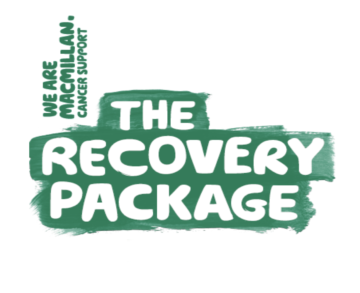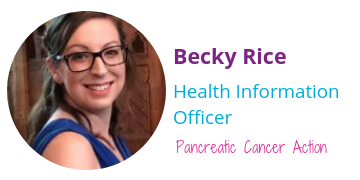The cancer recovery package
The cancer recovery package was first introduced in 2016 with the aim to improve quality of care for anyone with a cancer diagnosis.
What is a recovery package?
 It was created in collaboration with Macmillan Cancer Support and aims to treat the whole person, not just their cancer. The recovery package should be available to everyone with a cancer diagnosis, regardless of the type or stage of cancer.
It was created in collaboration with Macmillan Cancer Support and aims to treat the whole person, not just their cancer. The recovery package should be available to everyone with a cancer diagnosis, regardless of the type or stage of cancer.
The package consists of four items that taken together, allow patients, carers and health care professionals to understand the person, their disease and what support they may need. The aim is to look at the person as a whole and consider the physical, emotional and social aspects of their life which may be affected by their illness. At the end of the process, patients should feel that they know what has happened to them, what will happen next and the level of support to expect. They should be empowered to manage their disease and who to contact for help when its required.
The four items in a recovery package are;
|
|
|
|
Holistic need assessment and care plan
Everyone with a diagnosis of cancer should be offered a holistic needs assessment. This often takes the form of a questionnaire and aims to identify any physical, emotional or social needs which have been affected by the cancer. This may include side effects of treatments, problems at work or anxiety. The assessment can then be used to create a care plan, documenting each of the identified problems, why they are happening and the plan to solve them.
A needs assessment can be updated anytime, mainly when there is a change in the persons condition and the care plan can be shared with carers and health care professionals.
Treatment summary
Many people with cancer undergo several treatments for their disease. It can feel difficult for patients and carers to keep up with what is happening and why. A treatment summary explains the treatments a patient has received and why. It is produced by health care professionals at the end of the first treatment given to a patient (for example chemotherapy or surgery). It can then be updated after each treatment and shared with anyone who becomes involved in caring for the person with cancer.
Cancer care review
Anyone with a diagnosis of cancer should have a cancer care review carried out within the first six months of their diagnosis. When the review is carried out depends largely on the circumstances of the persons diagnosis. The review can be completed by a doctor or nurse in primary care and should be used to inform patients of any assistance or services available to them to help manage their disease. This includes anything from financial support to social assistance. The review should also be used to inform patients of the long-term effects of cancer and the support that is available to them longer term coping with the effects of the disease. The review can be repeated anytime but most often if there is a change in the persons condition.
Health and well-being events
Everyone with cancer should be able to access a local health and wellbeing event in their area. These events may be for cancer patients in general or more specific to a certain disease (for example breast or prostate cancer). Events may take place in health centres or the community and are run by people who can provide information and sign posting to help answer any questions patients may have. They may be run on a specific topic such as financial assistance or keeping active or may be a more drop in style event.
Health and wellbeing events provide a way for patients and carers to meet other people in a similar situation to themselves and to exchange stories. They are useful for discovering local resources available and any support groups available.
Getting a cancer recovery package
The cancer recovery package may differ around the country. Macmillan Cancer Support have produced a number of guides and materials for health care professionals, but these are not always implemented. Some areas use their own systems, others are still putting these measures into place.
Patients may need to ask for a cancer recovery package, as they are not always routinely offered.
Follow up care
The cancer recovery package should be updated regularly so that when treatment stops, the plan remains active and valid. This may mean that for some people the focus of the plan moves towards palliative care and planning for end of life. For others the focus of the plan will move to survivorship and life after cancer. Patients who have had their cancer successfully treated may be offered support to self-manage their care, such as symptoms to look out for or how to access services again if needed. Their monitoring is likely to be less frequent and more remote then people with more complex conditions.
